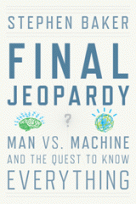















January 26, 2011 | permalink
Excerpt from Stephen Baker’s Final Jeopardy: Man vs. Machine and the Quest to Know Everything presented without comment:

The real problems started when Watson found itself facing Greg Lindsay, a journalist and a two-time Jeopardy champion. Lindsay, thirty-two, spent much of his time at the University of Illinois on the Quiz Bowl circuit, where he occasionally ran into Ken Jennings. In order to spar with Watson, Lindsay had to sign David Shepler’s nondisclosure agreement. IBM wanted to keep Harry Friedman and his minions in the dark, as much as possible, about Watson’s strengths and vulnerabilities. And Friedman didn’t want the clues escaping onto the Internet before they aired on television. This meant that even if Lindsay defeated Watson, he wouldn’t be able to brag about it to the Quiz Bowl community. For his crowd, this would be the equivalent of besting Kobe Bryant in a one-on-one game of hoops, then having to pretend it hadn’t happened.
Even so, Lindsay came with a clear strategy to defeat Watson. He quickly saw that Watson mastered factoids but struggled with humor and irony, so he steered clear of Watson-friendly categories. He figured Watson would clean up on Name that Continent, picking out the right landmasses for Estado de Matto Grosso (“What is South America?”) and the Filchner Ice Shelf (“What is Antarctica?”). The category Superheroes Names through Pictures looked much more friendly to humans. Sure enough, Watson was bewildered by clues such as “X marks the spot, man, when this guy opens his peeper” (“What is cyclops?”). Band Names also posed problems for Watson because the clues, like this one, were so murky: “The soul of a deceased person, thankful to someone for arranging his burial” (“What is the Grateful Dead?”). If the clue had included the lead guitarist Jerry Garcia or a famous song by the band, Watson could have identified it in an instant. But clues based on allusions, not facts, left it vulnerable.
More important, since the currency they were playing with was worthless, he decided to bet the maximum on each Daily Double. If he blew it, he lost nothing. And since he wasn’t on national television, his reputation wouldn’t suffer. As he put it, “There’s no societal fear.” Yet if he won his big bets, he’d be positioned to withstand Watson’s inevitable charges through categories it understood. “I knew he would go on tears,” Lindsay said. “I had to build up big leads when I had the chance.” He aced his big bets and ended up thrashing Watson three times, once scoring an astronomical $59,999 of funny money. (The Jeopardy single-game record was $52,000 until Ken Jennings crushed it, winning $75,000 in his thirty-eighth game.)

» Folllow me on Twitter.
» Email me.
» See upcoming events.

Greg Lindsay is a generalist, urbanist, futurist, and speaker. He is a non-resident senior fellow of the Arizona State University Threatcasting Lab, a non-resident senior fellow of MIT’s Future Urban Collectives Lab, and a non-resident senior fellow of the Atlantic Council’s Scowcroft Strategy Initiative. He was the founding chief communications officer of Climate Alpha and remains a senior advisor. Previously, he was an urban tech fellow at Cornell Tech’s Jacobs Institute, where he explored the implications of AI and augmented reality at urban scale.

January 31, 2024
Unfrozen: Domo Arigatou, “Mike 2.0”
January 22, 2024
The Future of Generative AI in Architecture, Engineering, and Construction
January 18, 2024
The Promise and Perils of the Augmented City
January 13, 2024
Henley & Partners: Generative AI, Human Labor, and Mobility

----- | January 22, 2024
The Future of Generative AI in Architecture, Engineering, and Construction
----- | January 1, 2024
----- | August 3, 2023
CityLab | June 12, 2023
Augmented Reality Is Coming for Cities
CityLab | April 25, 2023
The Line Is Blurring Between Remote Workers and Tourists
CityLab | December 7, 2021
The Dark Side of 15-Minute Grocery Delivery
Fast Company | June 2021
Why the Great Lakes need to be the center of our climate strategy
Fast Company | March 2020
How to design a smart city that’s built on empowerment–not corporate surveillance
URBAN-X | December 2019
CityLab | December 10, 2018
The State of Play: Connected Mobility in San Francisco, Boston, and Detroit
Harvard Business Review | September 24, 2018
Why Companies Are Creating Their Own Coworking Spaces
CityLab | July 2018
The State of Play: Connected Mobility + U.S. Cities
Medium | May 1, 2017
Fast Company | January 19, 2017
The Collaboration Software That’s Rejuvenating The Young Global Leaders Of Davos
The Guardian | January 13, 2017
What If Uber Kills Public Transport Instead of Cars
Backchannel | January 4, 2017
The Office of the Future Is… an Office
New Cities Foundation | October 2016
Now Arriving: A Connected Mobility Roadmap for Public Transport
Inc. | October 2016
Why Every Business Should Start in a Co-Working Space
Popular Mechanics | May 11, 2016
Can the World’s Worst Traffic Problem Be Solved?
The New Republic | January/February 2016